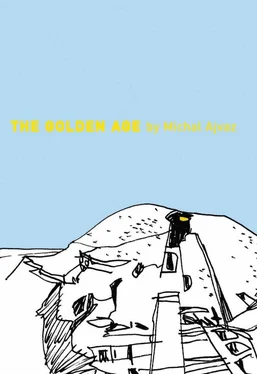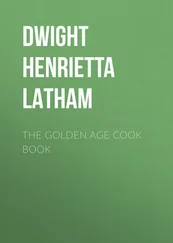Michal Ajvaz - The Golden Age
Здесь есть возможность читать онлайн «Michal Ajvaz - The Golden Age» весь текст электронной книги совершенно бесплатно (целиком полную версию без сокращений). В некоторых случаях можно слушать аудио, скачать через торрент в формате fb2 и присутствует краткое содержание. Год выпуска: 2010, Издательство: Dalkey Archive Press, Жанр: Современная проза, на английском языке. Описание произведения, (предисловие) а так же отзывы посетителей доступны на портале библиотеки ЛибКат.
- Название:The Golden Age
- Автор:
- Издательство:Dalkey Archive Press
- Жанр:
- Год:2010
- ISBN:нет данных
- Рейтинг книги:4 / 5. Голосов: 1
-
Избранное:Добавить в избранное
- Отзывы:
-
Ваша оценка:
- 80
- 1
- 2
- 3
- 4
- 5
The Golden Age: краткое содержание, описание и аннотация
Предлагаем к чтению аннотацию, описание, краткое содержание или предисловие (зависит от того, что написал сам автор книги «The Golden Age»). Если вы не нашли необходимую информацию о книге — напишите в комментариях, мы постараемся отыскать её.
is Michal Ajvaz’s greatest and most ambitious work.
The Golden Age
The Golden Age — читать онлайн бесплатно полную книгу (весь текст) целиком
Ниже представлен текст книги, разбитый по страницам. Система сохранения места последней прочитанной страницы, позволяет с удобством читать онлайн бесплатно книгу «The Golden Age», без необходимости каждый раз заново искать на чём Вы остановились. Поставьте закладку, и сможете в любой момент перейти на страницу, на которой закончили чтение.
Интервал:
Закладка:
I played on boards whose squares changed in the course of a single game. They were made of squares of darker and lighter sand sprinkled on the board. In the course of the game the wind would blow the sand about, into long patches run through with different colours, until the board became a whirl of darker and lighter twists, stretching and transforming, wrapping themselves into other twists, reminiscent of the jaspé bindings of books come to life in dreams; and the pieces would pick their way through them, before crumbling and blending in with the sand of the squares.
I taught myself to understand a little the peculiar delight to be had from taking up a position on a blurred border, where none of the segments into which the space is divided have any particular claim on us, where suddenly we encounter the existence of something neither left nor right, neither the same nor different, a third thing which is impossible yet real; we encounter a space the world does not know and that no world would allow, but which provides a strange, rather pleasant place to stay. I believe this space’s magical charm is somehow reflected in all the border territories we pass through on our travels, that it gives both shelter and danger, is at once a citadel and a trap. It is there in the city’s mysterious edges, where the fringes of a garden give sanctuary to ghosts woven of moisture and shadow, in the strip between road and field, perhaps in that unlit café on the seashore I happened across that night in Naoussa on Paros, whose last tables and chairs were being claimed by the waves as they rose and fell.
Often the pieces were of an indefinite colour, and this would change in the course of a game. Some of them crumbled or melted in the sun and thus became different. Sometimes a player would realize that the piece he had in his hand, with which he was about to make his final, victorious move, had transformed itself into one of his opponent’s pieces. As they underwent such transformations pieces would go through phases where it was impossible to say what they were like and to whom they belonged, but however monstrous they were still it was necessary to play with them, to move them about the fluid, borderless squares. Stranger still was the fact there was no clear boundary between piece and board; a piece might melt and become a square, or a square of the water-board, which was popular in the upper town, might take on a firm shape which then would be moved about the playing surface.
Nor were there set rules for the game. The rules would change in the course of a game, usually by appendices attaching themselves to edges and exceptions undermining from the inside the existing rules, which themselves would become a collection of appendices and exceptions and as such would dissolve. It is to be presumed that a new state of affairs on the board called for new rules. This provoked no argument between the players, who continued to sit over the board in silence; while one was interpreting the new rules from the positions of the pieces and the moves of his opponent and adapting his play accordingly, the other was trying to find the rules in the configuration of the board and the moves of his opponent, which themselves were informed by moves he himself had taken. Even in this complicated manner, which we can compare to an attempt to reflect nothing between two mirrors, in time some kind of tacit harmonization of the rules might have been reached; but around the time new rules were becoming fixed, the impression was created that they were out of tune with the new state of affairs on the board, so again they began to change.
In the beginning the games of the islanders were a cause of boredom or exasperation to me. Once when Karael and I were sitting at the board and after my thirtieth move I remained clueless as to what was going on, I threw a tantrum and scattered the pieces across the board. When I offered her a shamefaced apology, Karael laughed and said this act of mine had in no way spoiled the game and that it was still in progress; I had not fought free of the game or its rules. The rolling of the pieces about the board was simply an expression of a new version of the rules which was immediately assimilated by the game, which thus caught me in its snare.
And so would the island’s players sit over their game-boards of blurred squares with fuzzy borders that shifted in the course of a game, moving pieces which changed into other pieces and disintegrated in their hands, playing by rules which originated from the game in progress and underwent constant change. How strange it is that I, too, should come to find pleasure in a way of playing which looked infinitely complicated and laborious! But whoever explored it more deeply discovered that there was a simplicity in it, that the ground it moved us across was ground we knew intimately, and that the simplicity was a source of delight.
I don’t know the origins of the island’s games. It may be that they came to the island by way of the Europeans and that the islanders adapted them in accordance with their own tastes. It is also possible that board games originated on the island, that the way the islanders play them is the original way, that only later did they find their way to Europe and Asia, where their fluid rules became fixed rules and the borders between squares became calmer and more distinct, paving the way for the games we play today. But what if the boards of Europe were merely dormant, what if some disturbance of the modern age should wake them so that their borders were fluid once again and their squares began to pulsate?
The labyrinths of flavour
One of the reasons I stayed so long on the island was its cuisine. When I spoke of the island as the territory of lotus eaters, this was meant as nothing more than an illustration; but the islanders’ food was certainly one of the more pleasing aspects of life on the island. It happened on several occasions that I was standing on a terrace in the upper town when a ship flying a Greek or a Spanish flag entered the harbour. Each time I asked myself whether it was time for me to leave. And then I would remember the feast to which I had been invited the next day and would say to myself, “I’ll take the next ship, there’s bound to be another one along soon.” (And there always was, but there was always another feast, too.)
When I was first invited into the houses of the islanders, I found it surprising that there was never a stove or an oven to be seen. As the island lies on the Tropic of Cancer, there is no need for the islanders to heat their dwellings, but as for the preparation of food, it remained a mystery to me where the islanders performed this. I noticed that every house had a room where glass jars and pots of a great variety of sizes were lined up on shelves; all of these were filled with liquids and pastes and were aglow with bright colours. Only later did I learn that these rooms were pantries and kitchens in one: on the island the storage and preparation of food merged into a single act. One of the most striking features of the island’s cuisine was the suspicion with which the islanders treated fire. Changes brought about by fire seemed to them too quick and violent and as such incapable of producing anything to interest them. The seamen in the harbour who fed on roast or boiled meat, they viewed as barbarians. They thought that foodstuffs did not exude their most precious flavours when subjected to crude treatment by fire, that it was necessary to wait patiently for these flavours to show themselves and to learn and be alert to the signs of their coming. The islanders considered flavours to be dreams, perhaps even the thoughts, of foodstuffs, as ever-present melodies which foodstuffs held within, of which we caught a snatch when we dined. For the islanders, fire was too fierce and too crude to draw from a foodstuff its inner melody. Only the processes of gradual maturation were gentle enough to wake the dreams in a foodstuff, slow enough to allow us to hope we would catch the foodstuff at the moment its most splendid tones were sounding.
Читать дальшеИнтервал:
Закладка:
Похожие книги на «The Golden Age»
Представляем Вашему вниманию похожие книги на «The Golden Age» списком для выбора. Мы отобрали схожую по названию и смыслу литературу в надежде предоставить читателям больше вариантов отыскать новые, интересные, ещё непрочитанные произведения.
Обсуждение, отзывы о книге «The Golden Age» и просто собственные мнения читателей. Оставьте ваши комментарии, напишите, что Вы думаете о произведении, его смысле или главных героях. Укажите что конкретно понравилось, а что нет, и почему Вы так считаете.












